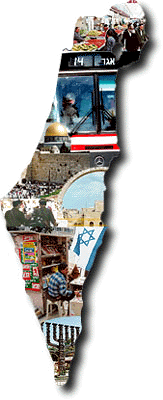Light Lines - Acharei Mos / Kedoshim
8 Iyar 5759 / April 24, 1999 Parshat Acharei Mos / Kedoshim
"You shall not take revenge and you shall not bear a grudge..." (Leviticus 19:18)
You wake up with a smile on your face. It's good to be alive. Another day. Another gift. As you leave your house, you bump into your neighbor. "Good morning, Fred!" you beam. "What's good about it?" comes the dour reply. He gets into his car and drives off. You try out your smile again, but you find that there's a little dent in it that wasn't there before.
The Torah prohibits a person from taking revenge: You ask your neighbor to lend you his lawn mower and he refuses. The next week he asks to borrow your drill. You're not allowed to refuse him because he refused you. That's called taking revenge. You're not even allowed to say "Of course, you can borrow my drill - I'm not like you; I lend my things." The Torah categorically calls this bearing a grudge.
The question arises however: If I'm not allowed to take revenge by refusing to lend my drill, shouldn't the Torah also prohibit my "friend" from refusing to lend me his lawn mower? After all, it was he who started things. If it hadn't been for him not lending me his lawn mower, none of this would have happened in the first place.
Someone who refuses to lend his possessions may not be the greatest guy on the block, but the Torah doesn't make it an offense to be stingy. What the Torah is concerned about is that his stinginess will generate hatred, that his bad character will sour that of his neighbor and turn his natural generosity into hatred. That cannot be allowed to happen. And so the Torah tells us to overcome our knee-jerk reaction and let our natural love of our fellow come through.
When your neighbor returns your friendly greeting with a look that could freeze a fire, don't let him control your life. Go on and smile. Don't let other people's behavior dictate who you are.
Light Insight | Love of the Land | The Other Side of the Story | Response Line | Ohr Somayach Home Page |
 Selections from classical Torah sources which express the special relationship between the People of Israel and Eretz Yisrael Ashkelon In Biblical times Ashkelon was one of the five most important Philistine cities. Here is where the mighty Samson slew 30 Philistines and used their outfits to pay off the wager which he lost to their countrymen through their trickery. The city's prominence as a stronghold of anti-Israel feeling is clear in King David's eulogy on Saul who was slain in battle by the Philistines: "Publicize it not in the streets of Ashkelon lest the daughters of the Philistines rejoice." The Prophets Jeremiah, Amos and Tzefania all prophesied the destruction of this perpetual thorn in the side of the Jewish community in the Land of Israel. The word scallion is derived from the Latin name Ascalonia given to a kind of onion extensively cultivated at Ashkelon. Modern Ashkelon, established in 1953 by the Jewish South African development company Afridar, is a major development town south of Tel Aviv which still contains many relics of its colorful past. |
Light Insight | Love of the Land | The Other Side of the Story | Response Line Ohr Somayach Home Page |
Judging favorably doesn't really require such fancy footwork. As the saying goes: Don't judge a man till you've walked a mile in...
The other day I was at a wedding of a close friend, in which I didn't dance. People thought I was rude but they didn't know the other side of the story. Unfortunately, I wasn't given the benefit of the doubt. People should have thought twice before talking about me.
What really happened was that since I was in such a rush to get to the wedding, I accidentally put on two different shoes that didn't match or even look alike! If I would have danced I would have made a complete fool of myself.
Light Insight | Love of the Land | Response Line Ohr Somayach Home Page |
Mark Spice wrote:
Dear Rabbi,I know kosher means foods etc. that are allowed. But what is the term for foods, etc,. that are not kosher?
Dear Mark,
In common jargon, non-kosher food is called "treif."
Actually, the Torah doesn't use the word kosher to refer to kosher food! Regarding animals, the Torah speaks about the animals that are tahor (pure or kosher) and tamei (impure or non-kosher). Otherwise, we refer to non-kosher food as "asur," which means "forbidden."
Regarding mitzvah-objects - like a Torah scroll, mezuzah or a succah - we refer to them as either "kosher" (valid) or "pasul" (invalid).
Produced by the Office of Communications
Editor: Raphael Scott Leban
Production: Eliezer Shapiro
Light Insight: Michael Treblow
HTML Production: Eli Ballon
© 1999 Ohr Somayach International - All rights reserved. This publication may be distributed to another person intact without prior permission. We also encourage you to include this material in other publications, such as synagogue newsletters. However, we ask that you contact us beforehand for permission, and then send us a sample issue.
This publication is available via E-Mail
Ohr Somayach Institutions is an international network of Yeshivot and outreach centers, with branches in North America, Europe, South Africa and South America. The Central Campus in Jerusalem provides a full range of educational services for over 685 full-time students.









